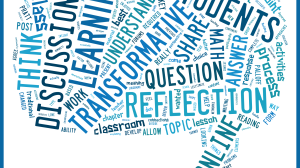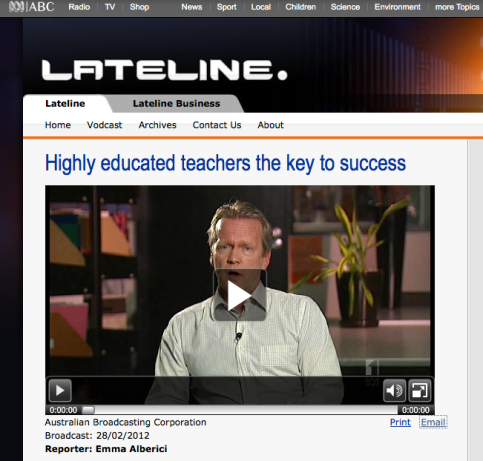Category Archives: M.E.T Program Boise State University
Subject related assignments and findings from my Masters of Educational Technology degree at Boise State University.
Sometimes WordPress.com just doesn’t work as easily as it should, this is when you call on and search the blogosphere for help. Thanks Social Wring, you made it easy.
Highly educated teachers the key to success
Just a shout out to the ABC (in Australia) and reporter Emma Alberici for putting together this great interview shown on Lateline on 28/02/2012 with Pasi Sahlberg.
I’m reposting here firstly for easy access to review it later, secondly to share with my PLN.
http://www.abc.net.au/lateline/content/2012/s3441913.htm (Reposted link here).
Can you imagine what it could be like if the job we did every day in the classroom was viewed with as much professionalism, esteem and respect as Medical Doctors… wow.
Online learning in 60 seconds…
Tick tick tick…
The clock is ticking and I’m meant to be logging in to my universities Moodle platform to find out what tasks I have due and what readings I should have done. Oh dear. Why is it that suddenly the little bookmark icons in my browser toolbar are suddenly screaming at me… have you checked Facebook today? What about the news? Maybe there is something happening in the Twitterverse?
This is the challenge with online learning, there are just so many distractions at our fingertips (mouse-clicks). It’s like reading an old choose-your-own-adventure-novel where you go off on all the tangents and choices you wouldn’t normally make just to see what happens knowing full well that you can come back and chose the correct path because it will “still be there”. My Moodle room is not going anywhere, the content will still be there but what we always under estimate is the time impact of these decisions.
This week in our class we looked at the Principles of Online Instruction and worked collaboratively with our classmates to peer review each others lists so we could review them before submission. I participated in the discussion forums and funnily enough felt more motivated to contribute and reflect on others work when I discovered that building an online community of learners in a course is one of the most critical attributes to successful online learning. Whilst our class group came up with many criteria there were of course plenty of overlaps, here was my revised list.
But don’t just take my word, whilst limited studies have been done, this meta-analysis by Means, B., Toyama, Y., Murphy, R., Bakia, M., and Jones, J. Evaluation of evidence-based practices in online learning: A meta-analysis and review of online learning studies. Technical report, Center for Technology in Learning. Retrieved from http://www2.ed.gov/rschstat/eval/tech/evidence-based-practices/finalreport.pdf surmised:
- Blended and purely online learning conditions implemented within a single study generally result in similar student learning outcomes.
- Elements such as video or online quizzes do not appear to influence the amount that students learn in online classes.
- Online learning can be enhanced by giving learners control of their interactions with media and prompting learner reflection.
- Providing guidance for learning for groups of students appears less successful than does using such mechanisms with individual learners.
So what does this mean for my classroom? Below is an excerpt from a discussion forum post I made during this course around using web-based collaborative tools in the virtual classroom.
Currently in Australia the online education space is really only in the hands of Distance Ed organisations and the Tertiary / University arena. It really hasn’t made a splash at the Senior / High School level and that is why I’m doing my Masters! I’d love to be among the first to develop and teach some of the first online high school Math classes here in Australia. I’d even love it more if our school could become reknown for having some of the best online Ed programs in the country. Fingers crossed.
So do I see value in Web-based collaborative tools?
Absolutely 100%, especially with Online classes but I do agree with so many of my peers above that the scaffolding and boundaries need to be clearly established for a successful outcome.The value I see is exactly in the area our readings highlighted this week – it helps build a sense of community when done properly. There is no better way in a traditional setting for a group to learn each others strengths and weaknesses than to give them a challenge of building something or solving a team challenge that requires everyone’s input. I see web-based collaborative tools in the same way, especially multi-player gaming. Imagine if the first component of an online course was a free account to some MMORG where you had to meet everyone in the course, exchange items for survival and then “find the lecture cave” on an Island like Myst… boy I’m getting excited just imagining it – sign me up now!
However, given I teach in a Blended learning setting and use technology almost everyday and every lesson I have found Web-based collaborative tools a challenge. I have used resources like Google Docs for building a class glossary of math terms, Etherpad.com (before Google bought them and they became the basis for Google Docs), DabbleBoard.com which also works with the Livescribe Smartpen (not collab but a super useful and cool tool). The pitfalls in implementing collaborative activities using Web-based tools in a Blended environment is that with everyone online at once in the classroom the excitement of their “key actions” appearing on the projector for everyone to see along with 30 other students is overwhelming. Everyone types at once, draws at once, deletes others work, etc etc until it gets a little out of control. This has been for Grades 7, 8 and 11 and 12. For some reason I still haven’t learned my lesson either and each time a I think of something new to try with it I start it the same way but writing this just now I’m finally having a chance to reflect and I realise that it might be better to try this method for a blended setting:
1) Create the tool and sign everyone up but don’t share the information.
2) Introduce the tool in class on one screen and explain the guidelines etc.
3) Set the HW task for the week for each student to access the collab resource and add their information or contribution to the site.
4) Review it before the next face-to-face lesson and give feedback.
What do people think? Would love feedback or other ideas suggestions if anyone has also used collaborative web-based tools in a Blended Learning setting with or without success. Let me know in the comments below or via twitter @dougvass.
Tick, tick, tick… as you can tell if you’re still reading it took way over 60 seconds. Online learning is about building a community of learners and this takes time online. It won’t happen overnight, but with the right tools and a well-trained instructor, it will happen.
Happy learning.
To Wiki or not to Wiki
What is this Wiki business all about? Good question…
A wiki is a collaborative website, essentially a webpage that can be edited by multiple users from anywhere in the world, even at the same time. Here is a relatively short and very well designed video that explains in plain English.
So now you know what a Wiki is here is your choice, is it or could it be a useful tool to use in the classroom, virtual or not?
Over the past two weeks I have been co-editing a Wiki site for Virtual Icebreakers. We looked at a number of traditional icebreaker (get to know you) activities and had to convert them so that they would work in an online classroom. Whilst this was an interesting and intellectual task to put yourself in the position of teaching a virtual class and how a traditional activity could work it was pretty easy. It was especially easy because could create your own page in the wiki for your own icebreaker and didn’t have to worry about anybody else. The difficult part came working on the wiki as a whole, deciding on the layout, wondering who was doing what, wondering if it was “fair”. I tried putting myself in my students shoes and “Fairness” was the issue which kept popping up for me, how could our Professor measure how much each of us had contributed, how much time we had spent, or even whether someone may have maliciously changed our content to make it look worse.
Isn’t this sad?…
I thought so, my gut reaction as a student was to get competitive, wonder who was beating me or whether what the other person was doing would look or sound better. I was worried about other students being just as competitive even to the point of interfering with my work. I couldn’t have been more wrong… but I do think competition and the desire to “win” the learning game could still be an issue with collaborative projects like Wikis. But hang on isn’t it always a potential issue with collaborative / group tasks? Unless you are allowed to self select your team then there is always the potential of someone not “pulling their weight”. However I would argue this is where the real learning takes place, dealing with people, managing tasks, organising and planning so that the group doesn’t suffer as a result of the slack team member. Often called soft skills they are now recognised as some of the most necessary in the global business world of management.
But what does the research say? Well surprisingly there is not a lot out there but one recent paper from Hagit Meishar-Tal* and Paul Gorsky, Wikis: what students do and do not do when writing collaboratively (Open Learning, Vol. 25, No. 1, February 2010, 25–35) actually found:
“In accord with previous research, students most frequently add content to a wiki rather than delete existing text; and contrary to previous research, students modify existing texts to a greater extent than previously reported.”
It was also interesting to note that the personalities of the contributors could almost predict the way they would collaborate. Whilst Gorsky and Meishar-Tal speculate on this it was definitely something I viewed empirically. Personally I am quite dominant and opinionated and as a result was not hesitant in making changes or deleting aspects of the wiki which I felt did not fit the task at hand. I also would estimate that I was one of a few “big” editors, not necessarily “content contributors” but a mover and editor of themes and layout – a stylist. In Gorksy and Meishar-Tal’s words:
The findings also showed that a minority of students (about 10%) were extremely dominant. The dominant students were ‘specialists’ who created near ‘monopolies’ on certain kinds of editorial actions: one ‘mover’, two ‘deleters’, one ‘stylist’ as well as one student who served as ‘formatter’ and ‘linker’. These roles and behaviours were assumed without any direct instruction, apparently quite spontaneously. Such findings are consistent with previous ones that investigated participant behaviour in Wikipedia, online communities and OUI course forums. The founder of Wikipedia reported that 2.5% of all users contribute 80% of all content. Furthermore, 50% of the content is generated by only 1% of the contributors (cited in Tapscott & Williams, 2007).
In my opinion this could not be more accurate. Our group did not receive direct instruction on roles, nor on layout. We initially started discussing within the wiki until I created a Google Group and shifted it into a forum linked to the site. People then posted ideas and suggestions but in a group of 20+ people working Internationally over the web you couldn’t exactly wait for consensus. After 2 or 3 others had commented on the idea it was left up to the originator to decide what to do and most of the time they did.
Putting my teachers hat on now I’d be interested to see how I could implement it in my Mathematics classroom. I have already implemented a Glossary wiki (funnily enough after I’d started this project but before I’d read the research paper!) in the format of a Google Doc but there are other questions I need to get answers to before rolling it out. I’m interested in the personal, reflective feedback from all the learners in the process. How did everyone feel about it? And how much of their views are biased by their personality or learning style? Is it right to make people feel uncomfortable whilst they learn by forcing them to work collaboratively? What checks and balances can the teacher give to reassure those students who are worried that their great work will be lost amongst others more mediocre contributions?… Ah the joys of collaboration and education.
What would you do, Wiki or not Wiki?
PS – here’s the wiki in question.





